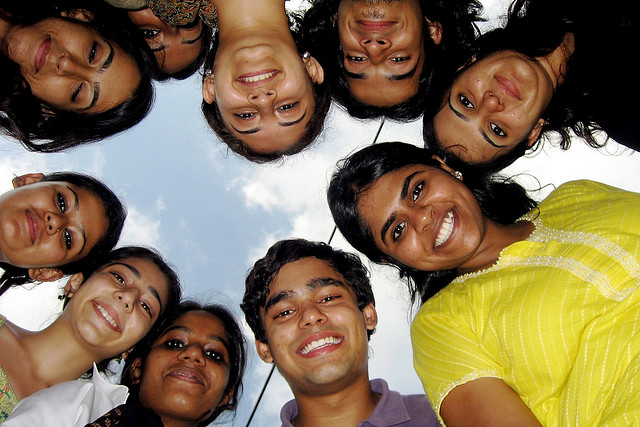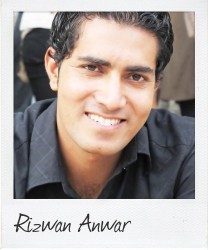"Youth as part of the new political leadership"
March 22nd, 2014Youth are sometimes seen as too immature to take part in politics, writes Rizwan Anwar, 24, a Correspondent from Lahore in Pakistan. But he argues that democracy means including youth who want to shape the future.
People between the ages of 15 and 29 constitute youth. Those in their teens among the youth are said to be of tender age. They are not considered experienced and knowledgeable enough to understand the complex world of politics.
That is why some people believe that the youth should not take part in politics. But the youth should actively take part in the process of elections whereby the candidates are chosen to form governments at the state as well as central level.
The basic principle of democracy is that it should have wide participation by the people. The larger the percentage of voters out of the total population of the country, the stronger is the base of the democracy because the mandate given in the elections would have a popular support.
By the active participation of youth in politics and leadership in the 21st century we are given the message that our youth is mature and wise enough to understand their responsibility, and that they would give their mandate after carefully considering the candidates’ capabilities.
Being young, they are not swayed by the old systems of caste, creed and other orthodoxy which had been the bane of Indian politics for quite some time in the post-independence era. After all it is the youth who ultimately will become the stalwarts in politics and one day will hold the reins in their hands.
There has been much debate and discussion in various circles across the world on whether the youth should take part in politics.
We strongly believe that not enough is done to encourage the young of today to get involved with politics, yet as a large portion of our society they should be allowed more access to politics to shape the world they live in.
Many people believed that the youngsters being of a tender age do not fully comprehend the intrigues connected with politics, for which it is often called a dirty game. They fear that if the youth get entangled in political activities, they will lose direction and purpose. Another fear is that politics is dominated by middle-aged and old people. If the youth also enter the arena, there will be an atmosphere of rivalry. Belonging to different generations, there is a possibility of generation gap, misunderstanding and even rejection of one age group or other. Some have the opinion that those among the youngsters who are students and at the threshold of a career will suffer immensely if they go astray by missing their classes to take part in meetings and rallies. Being immature and inexperienced about the demands of life they may be left behind in their career and face great loss in their life at a later stage by losing valuable time as students.
It is necessary to have a look at the situation prevailing in colleges and universities where elections are held every year for the posts of President, Secretary, Treasurer and other office bearers. The atmosphere is full of political rivalries and intrigues near the elections. There is canvassing, campaigning among the students, presenting the qualities and plans of the respective candidates. The university elections have assumed huge importance as national parties.
There can be a long discussion on whether the politicians should be allowed to sustain this cult. But we can say with a considerable degree of consensus that the young, adults, or old and established politicians should not be stopped from taking part in active politics as long as they do not take undue advantage of their parentage and position. Being the citizens of a democratic nation they have every right to become active politicians.
We can conclude by saying that today’s youth are highly intelligent and educated. They have a high awareness level. If they take part in politics, they will enrich it with their new ideas and leadership. The youth believes in politics nowadays though there are some who don’t. We, the youth, want to do something for the nation but growth is hampered by the growing corruption in politics. Yet the purpose of life is a life of purpose. The youth want to do something in life. They have aspirations, beliefs, and faith to make their nation a superpower. Superpower doesn’t only mean the power in arms, war weapons, or missiles. But surely it also means the power of education and the power of economic prosperity .
photo credit: Kyle Taylor, Dream It. Do It. via photopin cc
…………………………………………………………………………………………………………………
About me: I am a social entrepreneur, Chairman and founder of Youth Revolution Clan. My work has earned four awards including Chief Minister Youth Excellence Award and Cultural Revolution Award by the United Nations Association of Civilization and Government of the Punjab.
I am working in close association with government, NGOs, local agencies and youth associations for society. I have visited Germany, Switzerland, Austria, Belgium, Liechtenstein, France & United States of America as a Youth Activist and Peace Ambassador.
…………………………………………………………………………………………………………………
Opinions expressed in this article are those of the author and do not necessarily represent the views of the Commonwealth Youth Programme. Articles are published in a spirit of dialogue, respect and understanding. If you disagree, why not submit a response?
To learn more about becoming a Commonwealth Correspondent please visit: http://www.yourcommonwealth.org/submit-articles/commonwealthcorrespondents/
…………………………………………………………………………………………………………………





